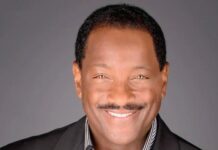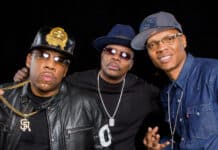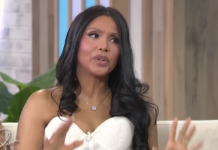
*Director Deborah Riley Draper’s extraordinary documentary “Olympic Pride, American Prejudice” explores the untold story of the 18 African American athletes who competed in the 1936 Olympics. Narrated by Blair Underwood and set against the strained and turbulent atmosphere of a racially divided America, which was torn between boycotting Hitler’s Olympics or participating in the Third Reich’s grandest affair, “Olympic Pride, American Prejudice” follows 16 men and two women before, during and after their heroic turn at the Summer Olympic Games in Berlin.
EUR/Electronic Urban Report chatted with Draper (Variety’s “10 Documakers To Watch”) about the historical impact of these athletes, who represented a country that considered them second class citizens and competed in a country that rolled out the red carpet in spite of an undercurrent of Aryan superiority and anti-Semitism.
“Olympic Pride, American Prejudice” held its world premiere at the Los Angeles Film Festival on June 4, and advance tickets to screenings sold out within minutes. Draper acknowledges that audiences are now hungry for refreshing black narratives that do not center on the slave and massa archetype.
DEBORAH: We have so many narratives, so many heroes. I just think all P.O.V’s should be represented. The African-American slave history is the part of our history that’s been more vividly told and shown and the one that’s repeated the most. But there’s so many other instances on how we change the world. I love playing in the space of sports. My first documentary played in fashion and how we changed the runway, so these are really underrepresented voices. These are also arenas where we don’t always get to show how ordinary people can do something extraordinary and so I’m really grateful that these families trusted me with their story to tell.
Is that the takeaway message of the doc? That ordinary people can do extraordinary things?
DEBORAH: That’s a part of it but I’m African-American so I like to say how African-American people, can do extraordinary things, but it’s really a human story. It’s important that we are reminded that it takes all types of people, all races, all creeds all colors and genders to make a wonderfully beautiful world. Sometimes we forget that and want to marginalize and discredit voice, and we can’t really do that. We have to look at humankind and that means everyone gets to participate and everyone gets to have a voice. That’s why the iPhones are great because it gives people a change to preserve their history and preserve stories in a way that they may not have been able to. We can’t wait, as storytellers and filmmakers, for someone to give us permission to tell a story. So if the iPhone is the way to do it and if crowdfunding is the way to do it, we deserve to see and hear wonderful stories.
READ RELATED STORY: ‘Roots’ Star Anika Noni Rose: ‘We Need To Hear About Our Holocaust’ [EUR Exclusive]

(Source: Randy Shropshire/Getty Images North America)
How did you lure Blair Underwood in as an executive producer?
DEBORAH: Blair is amazing. He is an African American history buff and a history buff. So when we sent him the trailer, he was immediately attracted to the story and wanted to be a part of it. He is one of the executive producers and the voice of the film as the narrator. He grew up in Germany and for a little while his father was in the military, so he was very familiar with Germany and the Jackie Robinson story but was not aware that Matt Robinson, Jackie’s older brother, was actually on the 1936 team. So all of these things kind of sucked him into the story the same way that it sucked me into the story.
The Olympic games are awarded to a city years in advance of the actual competition. So when Berlin was awarded the games in 1931, no one could have expected Hitler’s racist rise to power would overshadow the events — leading several countries to call for a boycott, including the United Sates. Many blacks felt like calling out Hitler for his racism was ironic considering black citizens were still denied basic human rights in America and public lynchings remained a fond pastime. As a few colleges began accepting talented African-American athletes into their sports programs, many took up Track and Field — which was one sport where blacks could compete, such as Jesse Owens.
Many know of Jesse’s historic win of four Gold Medals during the Berlin Olympics. However, there is very little record of the other African-American athletes who also defied Hitler’s social order. Ten men competed in Track and Field during the Berlin Summer Games: Jesse Owens, Ralph Metcalfe, Matthew Robinson, Cornelius Johnson, Dave Albritton, James LuValle, John Woodruff, Archie Williams, Frederick Pollard and John Brookes; and two women, Tydie Pickett, Louise Stokes. The six men named to the Olympic boxing and weightlifting teams were Art Oliver, Howell King, Willis Johnson, James Clark Atkinson and John Terry.
Draper explained why the pride and prejudice that these athletes experienced before, during and after their participation in the 1936 Berlin Olympics should serve as inspiration and never be forgotten.
“It’s really critically important that we understand our cultural inheritance,” Deborah said. “There’s a lot of rhetoric that happens in political campaigns, and the things that are happening in our country and across the world today, that we really forget the very valuable lessons and the valuable stories that will help us deal with what we have to deal with now in a more mindful and meaningful way,” she explained. “So in 1936, in the midst of a boycott and in the midst of a presidential election, with rhetoric and propaganda on both sides of the Atlantic, 18 very courageous and heroic African-Americans, including two women, were able to find themselves on the 1936 American Olympic Team and represent a country in which they aren’t able to vote and go face Hitler and demonstrate that they’re not only intelligent and capable but they are world-class athletes and world-class ambassadors for America,” she added.
“They are gracious and smart and talented and they are the types of role-models that everyone can look up to and understand that you have to do things that may seem scary, and might have to do things that you have not done before in order to change the world. So if you think about it, if these 18 African-Americans had not become international sports stars in 1936, where would integration in America be in terms of sports? If this hadn’t happened in ’36, you wouldn’t see Jackie Robinson in ’47. His brother was on the 1936 team. So they’re planting all these great seeds in 1936 that we’ve been harvesting ever since. So that’s why I wanted to tell the story.”

(Source: Randy Shropshire/Getty Images North America)
Describe some of the challenges you encountered with trying to pull together archival footage and secure talent willing to share their story for the project?
DEBORAH: So many of the resources didn’t even name all 18 of the African-Americans. Sometimes they said it was six, sometimes they said it was ten. Sometimes they said it was 12. Sometimes they said it as 14, so we had pictures and could see there were 18, but finding their names… ya know — they were calling at least three of them Johnson. That was problematic because they were misnaming these African-American athletes. So getting the correct names and matching the names to the pictures, finding the families, figuring out what the best sources of archive material, not only about the 1936 Olympics, but we wanted material that dealt with their trip over, their time on the boat and their time in the village, not just their time on the track and in the ring. We wanted to understand what their human experience was from the time they decided that they wanted to compete in the Olympics — which was happening in the middle of a boycott in America — to the trials, to the boat, to the village then to the competition and when they came home. So there were these pieces of information that we needed to string together to create the entire story. That required us to research in Germany and of course research here in America.
It took Draper and her creative team 4 1/2 years to compete “Olympic Pride, American Prejudice,” and she calls the journey “remarkable” because, “4 1/2 years ago I had no knowledge of the other 17 people. I was only aware of Jesse Owens being on the 1936 team as the only African American. I had no idea these people existed. Now I know their families, their children, their grandchildren. I am a part of their family in a way, and their families are grateful that our team is able to tell this story that’s 80 years past due in recognition.”
Draper added that this project is yet “another opportunity to showcase and demonstrate that even in the toughest of circumstances, African-Americans contribute to our country’s history and they weave this fabric that makes us this stronger country and that’s really important to understand and really important to teach our children and ourselves because we sometimes forget.
It’s really important to remind people that we have a strong and powerful cultural inheritance and it’s ours, and we inherited that and we need to not only share it but to respect it, glorify it and lift it up in every opportunity that we can.”
“Olympic Pride, American Prejudice” will next screen at the acclaimed American Black Film Festival; screening in the Documentary Competition on June 17. Director Draper will then take the film to Brazil this summer, for a special screening event at the historical Cinemateca do MAM (MAM Cinematheque) – just in time for the next Olympic Games.
We Publish News 24/7. Don’t Miss A Story. Click HERE to SUBSCRIBE to Our Newsletter Now!





